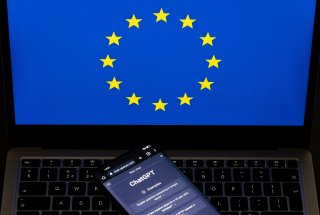America Should Not Follow Europe’s Terrible Example on Tech Antitrust
Warm words about innovation and competition, which often accompany new European antitrust laws, have not helped its own efforts at such. The continent’s share of global venture-capital investments has fallen over the past decade.
In a timely warning about what could soon happen stateside, European Union (EU) regulators are shamelessly weaponizing antitrust in an attempt to dislodge Silicon Valley’s hold over European consumers. Aggressive regulation of technology companies, especially American ones operating in Europe, is nothing new for Brussels lawmakers. The EU has been waging its war against Silicon Valley for some time. It employs an extremely loose definition of “monopoly,” passing sweeping regulations which broadside the U.S. tech industry. Warm words about innovation and competition, which often accompany new European antitrust laws, have not helped its own efforts at such.
The main front in Brussels’ antitrust battle is a pair of bills with innocuous-sounding names: the Digital Markets Act (DMA) and Digital Services Act (DSA). Together, they form a wide-ranging legislative package that aims to tackle past, present, and future problems with Internet use in one fell swoop. The time bombs in these two pieces of legislation are too numerous to name.
They propose, for example, preventing children from viewing adult content by mandating age verification for websites. That obviously won’t protect many young eyes; having grown up in the digital age, many kids are more adept than most adults at using VPNs and other tools to dodge digital obstacles. Standard age verification tools look like Stone Age technology compared to those children use to, among other things, play Fortnite on their school’s Wi-Fi network.
When the EU implements its blanket restrictions on content access, those tools will become even more accessible and sophisticated than they already are in Europe, leaving the law redundant. It could be disastrous for data privacy and security. Adult users will have to comply with ID checks. Criminals trading stolen personal information online is already common. Laws like this, which compel legitimate Internet users to hand over their details, will be a boon for online criminals profiting off it.
Through bills like the DMA and DSA, the EU insists on bombarding technology companies with gargantuan responsibilities, such as obliging online service providers to review user content pre-upload to tackle copyright violations, accompanied by the promise of relentless enforcement. The consequences for free speech and investment in Europe are likely to be dire. Europe’s share of global venture-capital investments fell dramatically in the 2010s, and data since then suggests the trend is continuing.
Most U.S. tech companies will have to modify their practices significantly to comply with these laws, such as by dramatically expanding their content moderation efforts, which seems sure to make their platforms much less convenient to use. They have a negligible impact on online safety, since it’s so easy to skirt the rules online. See no further than the creation of “PizzaGPT” after Italy banned ChatGPT.
Like most EU tech regulation, and indeed EU regulation in many other policy areas, the DMA and DSA reek of protectionism. When defending their aggressive approach to antitrust, European lawmakers speak of their desire to foster a new generation of European tech entrepreneurs and start-ups. But shutting out foreign innovators won’t help achieve that. Their measures hamstring innovation, increase costs for companies and consumers, and set Europe behind in the innovation race by curating an environment that is unduly hostile to American technology companies.
Even the artificial intelligence (AI) sector, brimming with competition between industry giants like Google, Microsoft, and insurgent new forces like OpenAI, is not enough to ward off the sledgehammer of EU regulation—in this case, the recent AI Act.
The EU boasts that it has created “the world’s first comprehensive AI law.” In practice, the Act clumsily categorizes some AI technologies as “high risk.” Creators of “high risk” products, which include any AI related to toys, cars, education, or any kind of biometric identification, will face a series of strenuous “conformity assessment procedures” and “horizontal mandatory requirements” before they can trade within the EU.
The Act also promises to “protect fundamental rights throughout the whole AI systems’ lifecycle” through further ongoing centralized monitoring of “high risk” technologies. Meanwhile, the Act classifies other technologies, such as real-time biometric identification, as “unacceptable risk” and bans them outright, cutting Europeans off from any innovative new products which use them. Rushing to be the first to regulate a fast-changing emerging technology when the landscape remains unclear is more of a curse than a boon for good policymaking.
Like many EU tech regulations, the AI Act is comprehensive—so much so that its sweeping pre-market requirements almost seem designed to make life difficult for technology companies wanting to do business in Europe. EU lawmaking often tars those companies with the same brush, seeing them all as part of a single monopolistic force rather than the competing forces they are.
Europe’s bad example ought to serve as a warning. The risk of the United States falling down a similar regulatory rabbit hole is real and urgent. Activist regulators in the Biden administration, such as the FTC’s Lina Khan, have made clear their admiration for the European approach. Only a concerted effort to speak up for basic freedoms and common sense in antitrust policy can halt the tide of overregulation in antitrust.
Jason Reed is a British policy writer based in London, UK, contributing to a wide range of outlets on both sides of the Atlantic. He works as Global Projects Manager at Young Voices, a U.S.-based non-profit organization. He tweets @JasonReed624.
Image: Shutterstock.

